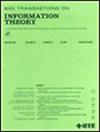A General Framework for Clustering and Distribution Matching With Bandit Feedback
IF 2.2
3区 计算机科学
Q3 COMPUTER SCIENCE, INFORMATION SYSTEMS
引用次数: 0
Abstract
We develop a general framework for clustering and distribution matching problems with bandit feedback. We consider a K-armed bandit model where some subset of K arms is partitioned into M groups. Within each group, the random variable associated to each arm follows the same distribution on a finite alphabet. At each time step, the decision maker pulls an arm and observes its outcome from the random variable associated to that arm. Subsequent arm pulls depend on the history of arm pulls and their outcomes. The decision maker has no knowledge of the distributions of the arms or the underlying partitions. The task is to devise an online algorithm to learn the underlying partition of arms with the least number of arm pulls on average and with an error probability not exceeding a pre-determined value求助全文
约1分钟内获得全文
求助全文
来源期刊

IEEE Transactions on Information Theory
工程技术-工程:电子与电气
CiteScore
5.70
自引率
20.00%
发文量
514
审稿时长
12 months
期刊介绍:
The IEEE Transactions on Information Theory is a journal that publishes theoretical and experimental papers concerned with the transmission, processing, and utilization of information. The boundaries of acceptable subject matter are intentionally not sharply delimited. Rather, it is hoped that as the focus of research activity changes, a flexible policy will permit this Transactions to follow suit. Current appropriate topics are best reflected by recent Tables of Contents; they are summarized in the titles of editorial areas that appear on the inside front cover.
 求助内容:
求助内容: 应助结果提醒方式:
应助结果提醒方式:


